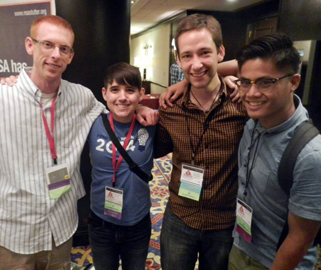
I stepped into a beautiful hotel lobby on a sunny Wednesday afternoon in Washington, DC. Almost immediately I could sense that this conference was going to be extraordinarily and terrifyingly special. I saw groups of people – hundreds of people – mingling, talking, and laughing. Old friends, spotting each other from across the room, excitedly called to each other to catch up on close friendships that had been put on hold since last July. Many “first-timers” were excitedly introduced to complete strangers as though they were family members not yet met. Others, like myself, stood for a few seconds on the sidelines with suitcases, watching in awe.
From the professional to the personal
I am a Speech-Language Pathology graduate student from Halifax, and I’ve stuttered since I was 7. In recent years, I have most often felt that my stuttering is mild, and that it rarely impacts my life. My reason for being at the conference was therefore mostly professional; if I wasn’t so interested in stuttering from an academic and clinical perspective, I likely would not have thought to attend. Beginning with that very first experience in the hotel lobby, the conference quickly became personal.
The energy I stumbled upon in that gorgeous hotel lobby was one of deep belonging, which is so powerful for a cohort of society who often feels isolated. To be honest, the depth of familiarity I sensed was initially overwhelming and intimidating. While I could still pass as an unaffiliated hotel guest, I made my way to the desk, checked in, and then went to my room without talking to anyone. I knew that the first workshop began in an hour, and that I should go downstairs to register for the conference. Instead, I sat on my bed for a few minutes, and reflected on what I had just experienced. I had come to this conference expecting to attend lectures and workshops, and to explore DC. I could already tell that I was in store for so much more.
Where stuttering is normalized
In the days that followed, what I found most life changing was the informal social aspects of the conference. I was surprised by the insights I gained while grabbing lunch on the town with a group of new friends, talking with people between seminars, and discussing our personal journeys with stuttering late into the night. Even when we weren’t talking about stuttering, the broader experience of just being surrounded by a thousand other people who stutter is what had the greatest impact on me. It normalized stuttering. Everyone was assumed to stutter, and everyone waited patiently when someone did. There was no discomfort, no awkward laughter, and no uncertainty about where to look. As a result, there was no impact on communication. No inferiority. No disability. It made me realize that it truly isn’t the repetitions, prolongations, and blocks that impede communication for people who stutter – the impact comes from the reactions, feelings, and perceptions of these dysfluencies, both from our listeners and from ourselves.
Support from a new family
During my 5 days at the conference, I was swept away into an unexpected personal journey with my stuttering that will continue for a lifetime. The experience made me realize that I still subconsciously and automatically hide my stutter and avoid speaking much more often than I had recognised. Now, two weeks later, I’m still processing what this means. Every day since my return, I carry my NSA coin in my pocket (as many of us do) to remind me of the tremendous support I have from this newly discovered family. I’ve found myself reaching down to touch my coin for a boost of extra encouragement when I need it. Since returning from the conference, I’ve stuttered with friends who I’ve never stuttered with before. It’s not because I’m more dysfluent. It’s because I’m more myself, and I’m not as afraid to have a voice.
Casey is a new member of the CSA Board of Directors.
